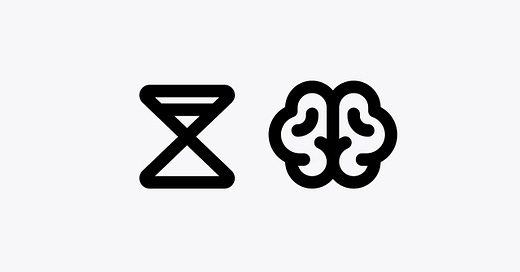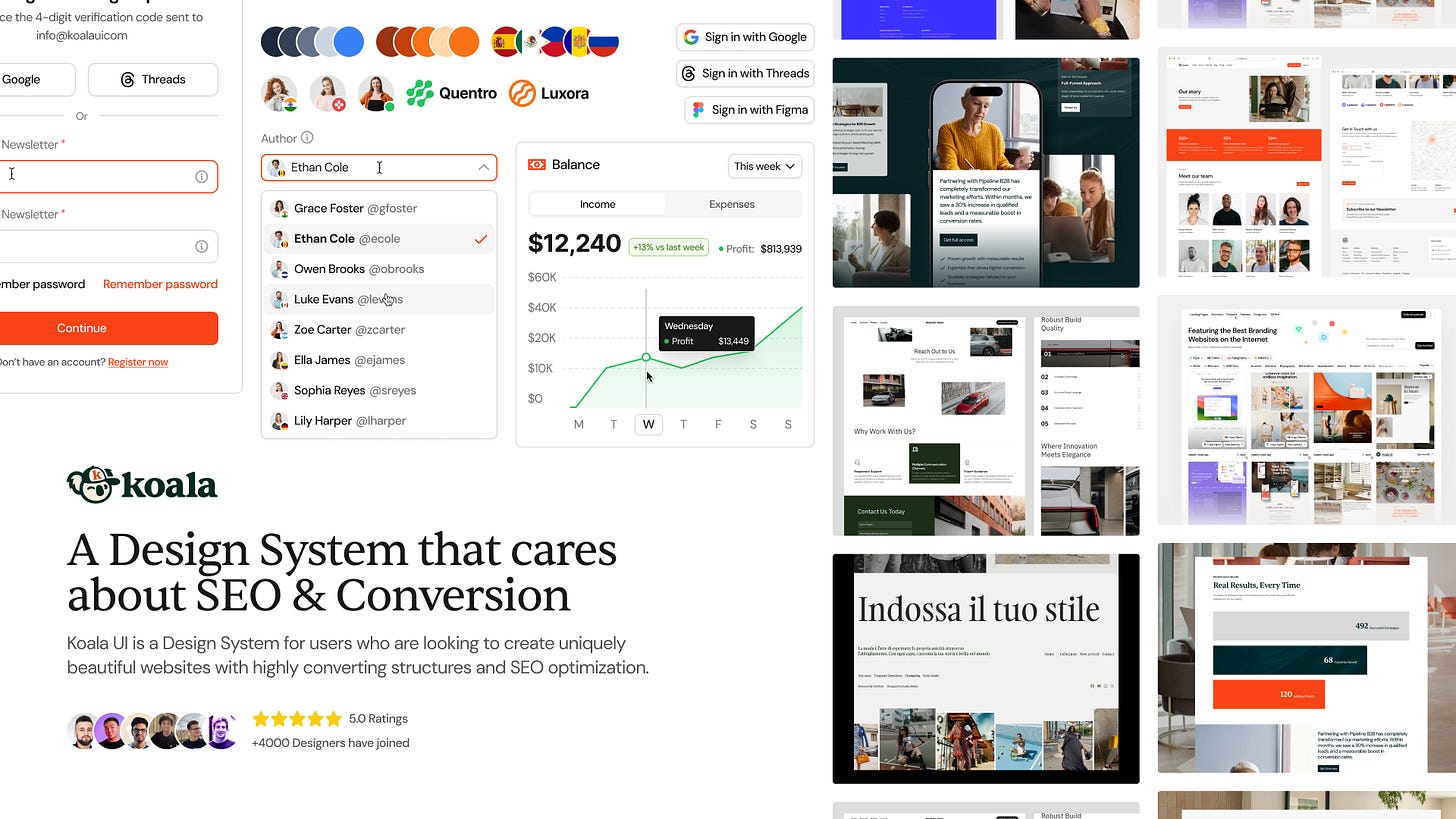🍹 I thought I was being productive, but I was just busy. · The Bunker #132
How to tell the difference between doing a lot and actually moving forward. How to prioritize correctly.
I don't know if this has ever happened to you, but for years I felt like I was making progress. That I was doing "important things." That every day I ended up exhausted was a day well spent.
But I wasn't really being productive.
I was just busy.
I’d go to the office for my 9–5 job. Between finishing work and the train ride home, I’d get back around 7 p.m. Then I’d work on Koala UI, hit the gym for a bit, and by then it was time to sleep.
The question is: what was I actually doing during those few hours I had to build Koala? I was progressing, sure, but not in fundamental ways. I think I was pouring hours into the details, things that didn’t really make a difference.
Yes, I was moving forward, but I wasn’t doing tasks that actually moved the needle. I was constantly busy, always doing something, but rarely measuring whether that something actually had impact.
And weekends were the same. I had all of Saturday and Sunday to work on Koala UI. Even if I spent 24 hours on it, I wasn’t always doing the game changer tasks, the ones that push the ship in a clear direction.
Being busy is a trap
Being busy gives you the illusion of progress, but more often than not, you’re just avoiding what really matters. It’s like cleaning your house when you’ve got an unpaid bill.
Or endlessly scrolling through Notion to “plan” without touching a single planned task.
And the worst part? It’s addictive. It feels good. It makes you feel useful. But it’s an illusion.
Because the important stuff, the things that scare you or make you uncomfortable are rarely urgent. So you put them off. And you cover them with small tasks that keep you moving but lead you nowhere.
This especially happened when I was at my partner’s place with my laptop on my lap, watching TV on the couch. I wanted to work, felt like I should use the time, and lied to myself saying I was “getting ahead.”
But in reality, no matter how much you want to be productive, working from the couch, with the TV on, with no focus, you're not going to get much high-level thinking done. Not for lack of will, but because the conditions aren’t right.
Still, I mentally logged that as “productive time.” As if just having the laptop open meant I was making progress. That’s dangerous, because it installs a false sense of progress in your mind.
The day I realized this
One afternoon, I was reviewing my income from the previous month and it hit me: I’d been “busy” for weeks, but I hadn’t sold anything. I hadn’t published. I hadn’t launched anything new. Nothing that truly moved the business forward.
Or the worst part, maybe I was selling pretty well. Does that really mean you're making good progress, at least enough?
It had been a month full of tasks, but empty of impact. Full of movement, but no direction.
That was my red flag. I started asking myself:
What have I done this week that had real impact?
Am I using my time to avoid hard decisions?
Am I procrastinating in a clever way?
And it’s a harsh truth, because I was working hard. I was doing a lot. I just couldn’t tell the difference between high-impact tasks and superficial ones. It wasn’t laziness.
It was a lack of priority.
In other words, I didn’t know how to prioritize.
That’s when I realized: working on the details is important, but only if you’ve clearly defined your high-impact tasks and stay conscious of them. These are the impactful tasks I must do. These are secondary.
Because yes, details make the product.
But when you’re building something from scratch, you must know what actually moves the needle, especially when your time is limited and your ambitions are big.
You can’t do everything, so you better choose wisely.
One more thing: a lot of times we don’t prioritize because prioritizing means letting go.
It means deciding not to tweak the button design today, because today’s job is to write the sales page.
And that’s uncomfortable.
So, this is how I fixed it (or try to)
Since then, I’ve stuck to one rule:
One important thing, first.
Before emails. Before Slack. Before Notion. That one task that makes me uncomfortable, the one that drives my project forward, the one that creates real difference.
It could be writing this newsletter. Recording a video. Preparing a launch. But just one. And it comes first. So all the energy from the day goes towards that one big task.
And if I only do that one thing, the day was worth it.
I apply the same rule weekly. What’s the one high-impact task I must do this week. Once that’s done, I can zoom in on the details, but only if that priority is nailed.
I even have a board where I separate tasks into two columns: impact tasks and accessory tasks. Not because the second ones don’t matter, but because I need to stay aware that they’re not to be confused with progress.
Some days I slip, of course. I fall back into the busy loop. But at least now I notice, and I fix it the next day.
If you’ve felt this way too…
You’re not alone. I’ve confused being busy with making progress. I’ve felt like if I wasn’t exhausted, I wasn’t really working. I’ve ended entire days having done nothing that truly moved my business.
But being busy is not the same as being productive.
And if you’re burning yourself out doing things that aren’t bringing you closer to your goals… maybe it’s time to pause, think, and prioritize better.
Here’s what I’d recommend when you’re facing a new project:
Define the project’s objective.
Once defined, identify which tasks will actually move the project forward. Choose one high-impact task per week.
From there, you can get into the details, but make sure those core tasks get done.
That way, if you’re ever unsure whether you’re using your time well, you only need to ask: Did I finish what actually moves the needle?
And if not, don’t beat yourself up. Just adjust. Accept that we’re human. But don’t let chronic busyness steal your focus.
This is one of the reasons I created products like Koala UI or the Notion templates: because real work needs tools that don’t waste your time on what doesn’t matter.
Tools that help you start with the essential.
Because what truly matters is that you make progress. That you grow. That you do less, but better. That you do what’s important before what’s urgent. That you work with intention, not just with effort.
And if you need a push, here are my favorite tools:
👉 Koala UI: Figma Design System
👉 Notion Freelance OS: To organize your business
See you next week ✌️
Jordi.
✨ This Week’s Sponsor
Koala UI is a Design System built for users who are looking to create uniquely beautiful websites with highly converting structures and SEO optimization.
Get 20% off with code: THEBUNKER20.
If you've ever wondered whether you can make a living through content creation, I’ve got something exciting to share!
I just released my book: From $0 to $10,000 in client projects with only 10,000 followers on Instagram, a journey of how I turned my passion into a profitable business.
🔖 The Bunker Bookmarks
⚡ [FREE] Favourite site for branding inspiration
🖊️ Freelance Notion Bundle · 16 Templates in 1 Pack
🖊️ My portfolio
🖊️ [FREE] Favorite Figma UI Kit
📕 The Ultimate Guide to Choose the Right Typeface · Workbook
🧠 [FREE] Second Brain for Creatives · Notion Template
🧠 [FREE] How to Make a Living from Social Media with Only 10.000 Followers
📕 [FREE] Typography is for everbody™
💖 [FREE] Favorite icon pack.
🤹🏻 My Equipment
✱· Most Productive Designer Mouse
✱· Office chair
✱· Sony A7IV




